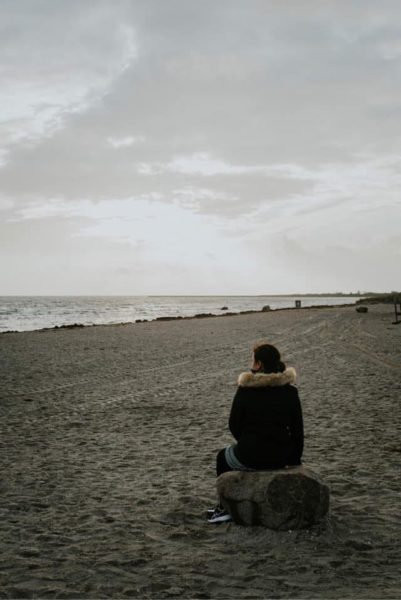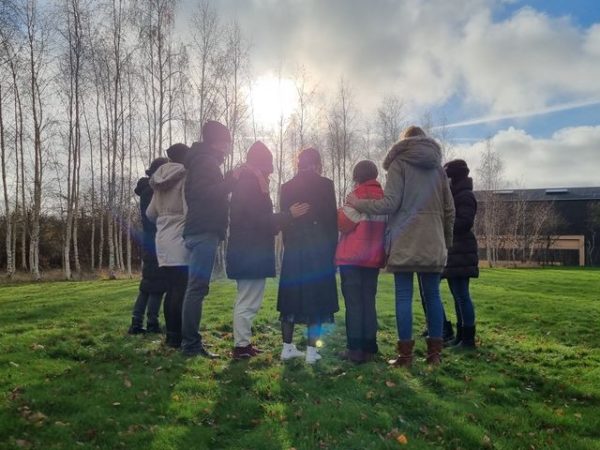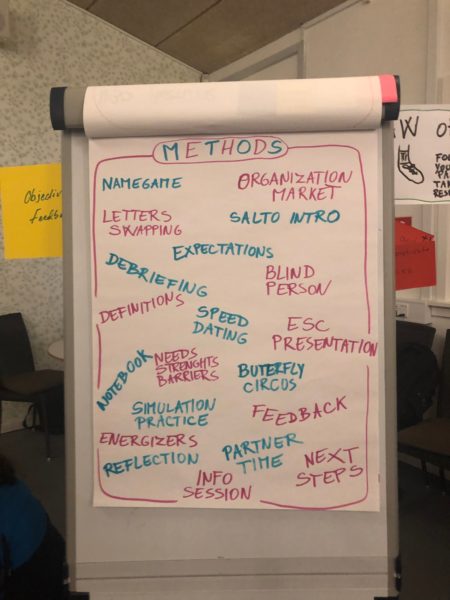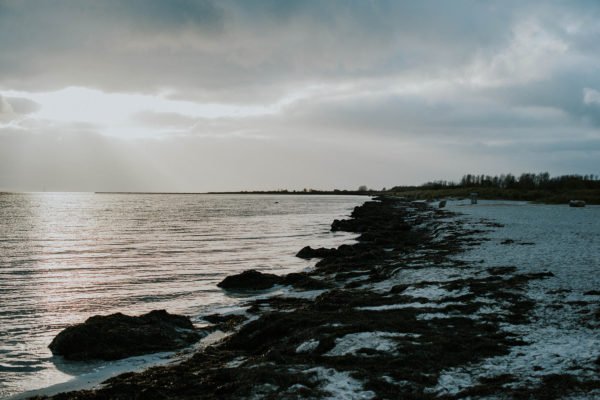This blog is written by Diana Zsoldos, former ESC volunteer, Communications and Logistics Officer for International Cooperation at the European Disability Forum.
The future of volunteering must be inclusive. Period. Because in an ideal world, being fully inclusive and accessible wouldn’t be a question, just a regular part of our everyday life. Well, our world is far from ideal, but it is promising to see there are amazing people working on it. You may ask now who they are, how they are doing it and why?
This is my experience from the SALTO training session in Ishøj, Denmark. Let me lead through my journey, talking as a former ESC volunteer, and as someone who has been working on the VIVID-T project for inclusive volunteering over the past 19 months.
I am sitting at the seaside, listening to the waves of the Baltic Sea, watching the glowing sunset. The route to Ishøj Strand is surprisingly accessible and flat. The air is chilly, and the colours of the evening are charming. I am not sure when was the last time I felt – if ever- that the world was such a calm and quiet place. I could almost picture the Little Mermaid jumping out of the sea in the distance. One of the best things about this mindful experience is knowing that very soon I will be back in a conference room surrounded by twenty-something amazing people from all around Europe, together with energetic trainers, and well-prepared organisers. Our week is full as well as joyful, and I am starting to believe in the power of non-formal education. Talking about non-formal education, volunteering abroad is one of the best forms of it. I could talk for hours about my first experience of living abroad at the age of 26, because it was such a formative experience in both my personal and professional life as a young woman. Every young person should get a chance to have this type of lived experience: to grow, to collect memories, to learn outside of classrooms, desks and computers.
route to Ishøj Strand is surprisingly accessible and flat. The air is chilly, and the colours of the evening are charming. I am not sure when was the last time I felt – if ever- that the world was such a calm and quiet place. I could almost picture the Little Mermaid jumping out of the sea in the distance. One of the best things about this mindful experience is knowing that very soon I will be back in a conference room surrounded by twenty-something amazing people from all around Europe, together with energetic trainers, and well-prepared organisers. Our week is full as well as joyful, and I am starting to believe in the power of non-formal education. Talking about non-formal education, volunteering abroad is one of the best forms of it. I could talk for hours about my first experience of living abroad at the age of 26, because it was such a formative experience in both my personal and professional life as a young woman. Every young person should get a chance to have this type of lived experience: to grow, to collect memories, to learn outside of classrooms, desks and computers.
The new application period for the European Solidarity Corps put a specific emphasis on inclusion and I am probably not the only one who warmly welcomed it. Here in Denmark, we are talking about people from a refugee background, LGBTQ+ communities, potential volunteers from low-income families, youth from rural areas or from the city. How can anyone from a big city have fewer opportunities than others? I asked the exact same question to our trainers. In some areas even your neighbourhood’s postcode can be a disadvantage, but this had never come to my mind before this training. Why am I talking about all these minorities? Because it might never cross your mind that people with disabilities live in each and every one of these groups too. The focus point here is whether they can function in the society in a fully inclusive way.

So far, what I’ve learned during our sessions, is that people with disabilities now get more opportunities to be part of ESC programmes and hosting/sending organisations can include accessibility costs in their budget. Hence, people with disabilities will have more chance to be volunteers and experience how it feels to be the giver, because the general thinking in our society that we can only be the receivers of voluntary work. I wouldn’t dare to say I became an expert on the European Solidarity Corps, but I certainly realised that submitting a Quality Label may be easier than it seemed at first sight, especially if you have such great, entertaining crowd around you while you are doing it.
Our participants were from age 25 to around 50 or more (sorry, it was rude to ask 😊), from very different countries, including Turkey, Lithuania, Afghanistan, and Georgia. They were teachers, entrepreneurs, government officials, mums, students, creatives or analytical people, women and men with and without disabilities. Everyone worked on the same topic: how to create a more inclusive society. We went to the Butterfly Circus together, laughed and cried, tried to make a straight line with blind-folded eyes, sang and danced, hugged trees in the middle of the wintery forest, swam in the cold sea and created a random theater around a lofty bonfire. Above all, we cared about each other, even though we were basically total strangers, but this is what inclusion should be about, isn’t it? We tasted inclusion and the power of mobility.
different countries, including Turkey, Lithuania, Afghanistan, and Georgia. They were teachers, entrepreneurs, government officials, mums, students, creatives or analytical people, women and men with and without disabilities. Everyone worked on the same topic: how to create a more inclusive society. We went to the Butterfly Circus together, laughed and cried, tried to make a straight line with blind-folded eyes, sang and danced, hugged trees in the middle of the wintery forest, swam in the cold sea and created a random theater around a lofty bonfire. Above all, we cared about each other, even though we were basically total strangers, but this is what inclusion should be about, isn’t it? We tasted inclusion and the power of mobility.
I believe everyone deserves to get a taste of it regardless having a disability or any kind of disadvantaged background. I hope more organisations are going to join the European Solidarity Corps in the next programming period and make volunteering accessible for all.

A special thank you goes to the Bureau International Jeunesse, SALTO Diversity & Inclusion and the Danish Ministry of Higher Education and Science who made this travel possible. I would like to also express gratitude for the VIVID-T consortium members, it was a pleasure to work on this community during the last 1.5 years, I wish you for a bright and inclusive future!
(Photos: CsanyiMonikaFoto)